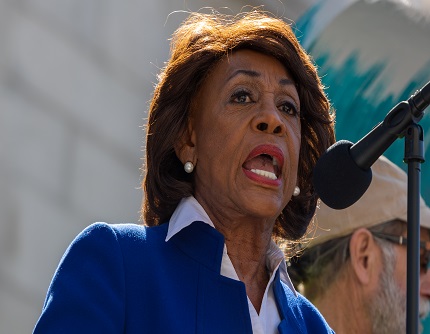A group of 55 House Democrats is urging officials at the Department of Labor (DOL) and White House regulatory affairs office to expedite their review of the DOL’s proposed investment advice fiduciary rule, noting that it will “strengthen critically needed guardrails.”
 Led by Rep. Maxine Waters (D-CA), who serves as the top Democrat on the House Financial Services Committee, the April 10 letter expressed the lawmakers “strong support” for the proposed rule as a way to “improve retirement investor protections when it comes the advice financial professionals provide related to employee-sponsored retirement plans.”
Led by Rep. Maxine Waters (D-CA), who serves as the top Democrat on the House Financial Services Committee, the April 10 letter expressed the lawmakers “strong support” for the proposed rule as a way to “improve retirement investor protections when it comes the advice financial professionals provide related to employee-sponsored retirement plans.”
“The Rule would fill existing regulatory gaps within the Employee Retirement Income Security Act (‘ERISA’), the federal law that sets the minimum standards for most retirement plans that private employers set up for their employees, such as 401(k)s and pension plans,” the letter addressed to Acting Labor Secretary Julie Su; Office of Management and Budget Director Shalanda Young; and Office of Information and Regulatory Affairs Administrator Richard Revesz, stated.
In addition to commending the DOL’s efforts, the lawmakers underscore the urgency of implementing the rule by citing the “staggering cost of conflicted advice,” which they note costs retirement savers at least $17 billion per year.
“We have long sounded the alarm on the need for strong regulations to protect our nation’s retirees from self-serving financial professionals, and there are major gaps in the regulatory framework that need immediate addressing,” the lawmakers further stated. “With this proposed rule, the DOL closes these loopholes once and for all and ensures that all retirement advice provided by financial professionals is made in the best interest of retirement savers,” they added.
Among other things, the letter explains how the proposed rule would revise the definition of an investment advice fiduciary under ERISA to encompass certain types of advice not currently covered, including:
- One-time advice about whether to roll-over a 401(k) (a plan set up by an employer) into a new retirement account like an IRA (a plan set up by the individual retiree) or an annuity;
- Advice about purchasing non-securities like fixed-indexed annuities; and
- Advice given to plan sponsors and employers (rather than just plan participants) about the types of products to include in their plan line-ups.
The proposed rule’s requirement that 401(k) plan-level protection extend to small business owners and participants is one of the main reasons why the American Retirement Association (ARA) advocated in strong support for the rule and why ARA CEO Brian Graff testified about it before the DOL in December.
To that end, the letter specifically outlines how the rule would close four key regulatory loopholes under the ERISA that are harmful to retirees, including how ERISA’s fiduciary best interest standard does not apply to recommendations made to employers that sponsor 401(k) plans.
“The Rule amends the fiduciary definition to bring financial advice made to retirement plan sponsors—many of whom heavily rely on the advice and services offered by retirement plan advisers and consultants—under the protections of ERISA’s heightened standard,” the letter explains.
It goes on to note that ERISA’s fiduciary best interest standard currently does not apply across the board to recommendations made to employers that sponsor 401(k) plans, only to the retail investors that benefit from the plans. Moreover, it notes that neither the Securities and Exchange Commission’s Regulation Best Interest (Reg BI) nor the National Association of Insurance Commissioner’s (NAIC) model rules apply to advice made to retirement plan sponsors, contending that those regulatory regimes do not provide adequate coverage.
Where Things Stand
The rulemaking package, which was published in the Federal Register on Nov. 3, 2023, was submitted to the White House Office of Management and Budget for review on March 8. The White House typically has up to 90 days to review the rule, but there’s no minimum timeline for review, such that it could be completed within 30 to 60 days, for example.
At present, the OMB still has meetings scheduled with outside stakeholders until April 15. Assuming there are no more meetings after that date, a final rule could be released within days of the OMB completing its review. One thing that won’t be known until a final rule is released is how it differs from what the DOL proposed last November.

